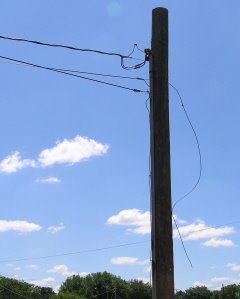Brad King, formerly of Wired News and now of Technology Review, is a proud Appalachian. That’s about as rural and small town as it gets. That’s why he has kept an eye on the slow progress of high-speed internet access, and the effect this has on business and culture.
King looks at AT&T’s announced plans to expand rural access to internet and IPTV through satellite delivery, High-Speed Web Goes Rural.
“We are beginning to offer satellite-based broadband service in areas where our DSL service is not available today, giving more consumers a broadband choice,” AT&T Chairman and Chief Executive Ed Whitacre said in a speech at the Detroit Economic club.
AT&T is partnering with satellite-based high-speed Internet provider WildBlue to provide the service.
Yvonne at Lip-Sticking applauds AT&T’s announcement.
I’m one of the ‘haves’. I’ve always had access to broadband. But, I know people who live in rural America who pooh-poohed the whole Internet thing for just so long – then, openly complained when they couldn’t get it.
She thinks Life in Rural America is About to Change:
I see this opening doors in rural America to help the Moms and Dads who still want that small-town, country-folk way of life for their families, still know that their kids will receive as good an education as any citified-kid in downtown ILOVEMYHOMETOWN, USA. Because, they’ll be able to give their kids access to the universe of knowledge found on the Internet…in their own home, where their parents can monitor its use.

OK, This is the part where I get opinionated. The AT&T headlines sound like immediate accomplishment, but read the full text. We are talking about selected markets and at least a three year roll out on this particular project.
I applaud every single step towards greater access for more rural people. But this one announcement isn’t enough to change the world for us. Unfortunately, the glowing headlines are just enough to make people think “The digital divide? Didn’t we already solve it? I’m sure I remember reading that.” This couldn’t be further from the truth.
King, the proud Appalachian, wrote a series of articles at Wired News in 2001 about “the gigantic cultural and technological gap between mega-connected cities and analog rural areas: Appalachia: Where Net Trails Off, Upgrading the Hillbilly Highway, and Cincy’s Artists Feel Tech Squeeze.”
The basic premise for the series was that it was going to take far more than running a few high-speed lines into rural areas to create a truly digital economy for the 21st century. The cultural gap facing many folks — not an inherent distrust of new technologies, but a lack of understanding of how these technologies can solve immediate, day-to-day issues — was far more concerning to me.
I’ve come to believe, though, that the cultural gap can be overcome simply by exposing a new generation of rural children in general — and Appalachian kids specifically — to the Web (and even more so to Web 2.0), by creating a true broadband infrastructure. We’re nowhere near that level of penetration, but it’s still nice to read that AT&T has finally decided to make a big push into rural areas…
The bottom line
Businesses and homes in rural areas will continue to rely on dial up access for years to come. I think changing the rural culture will take more than just exposing kids to the web and more than just building the infrastructure. It will take civic leaders working to integrate the new technology into business, government, and education. Our future is at stake.
small biz rural entrepreneurship broadband gap digital divide dialup











Is this not also a case of those with the power (aka broadband, and the lifestyle that accompanies it) preferring to maintain an elite status at the expense of the rural areas who “wouldn’t get it”? Perhaps losing a few dollars in business is worth knowing you’ve got access to something they can’t have?
A provocative question, Justin. Since I’m not one of those with the power, I honestly can’t say.
I can tell you that I have been assumed to be an idiot because of where I live.
And now, over a year later, any signs of change?
Will rural America ever be allowed to be on equal footing as urban America? CEO’s apparently don’t like in the country!